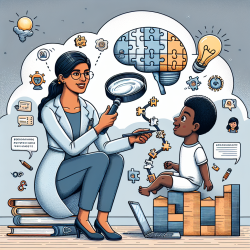Introduction
Engaging families in research is a growing trend that has shown significant benefits in the field of childhood disability. The research article titled "Building a culture of engagement at a research centre for childhood disability" provides valuable insights into how practitioners can enhance their skills by implementing family engagement strategies. This blog will explore the key findings from the study and offer practical advice for practitioners looking to improve their practice through family engagement.
Understanding the Research
The study conducted at the CanChild Centre for Childhood Disability Research at McMaster University examines how a culture of family engagement has been built over time. The research highlights the evolution of parent involvement from consultative roles to decision-making positions, including co-principal investigators. This shift has been supported by an infrastructure that includes training, knowledge mobilization, and social networking.
Key Findings and Their Implications
The research identifies several strategies that have been effective in fostering meaningful family-researcher partnerships:
- Training and Education: Providing training for both families and researchers to enhance understanding and collaboration.
- Knowledge Mobilization: Sharing research findings in accessible formats to ensure families can engage with and apply the knowledge.
- Social Networking: Creating opportunities for families and researchers to connect outside of formal research settings.
These strategies are underpinned by values such as openness to learning, commitment to relationship building, and a drive to improve. Practitioners can adopt these strategies to enhance their skills and create more effective partnerships with families.
Practical Steps for Practitioners
Practitioners looking to implement these findings in their practice can take the following steps:
- Foster Open Communication: Encourage open dialogue with families to understand their needs and perspectives.
- Build Relationships: Invest time in building trust and rapport with families to facilitate collaboration.
- Provide Training: Offer training opportunities for families to enhance their understanding of the research process and their role in it.
- Utilize Social Networks: Create platforms for families to connect with each other and with researchers, fostering a sense of community.
Encouraging Further Research
While the study provides valuable insights, it also highlights the need for ongoing research into family engagement in childhood disability. Practitioners are encouraged to contribute to this growing field by conducting their own research or collaborating with research centers like CanChild.
Conclusion
Building a culture of family engagement in research is essential for improving outcomes in childhood disability. By implementing the strategies identified in the CanChild study, practitioners can enhance their skills and create more effective partnerships with families. This approach not only benefits the research process but also leads to better outcomes for children.
To read the original research paper, please follow this link: Building a culture of engagement at a research centre for childhood disability.










